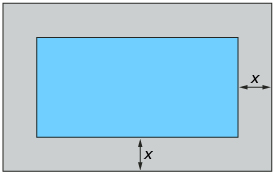Lesson 2
1. Lesson 2
1.9. Explore 5
Module 4: Quadratic Equations and Inequalities
Solving Quadratic Equations by Factoring
Use Solving by Factoring for guided instruction in solving quadratic equations by factoring. Pay attention to the sequence of steps for this strategy. Don’t be afraid to make a mistake—the applet will give you feedback and a chance to correct your errors.
To get started, do the following:
- Click on Solving Quadratic Equations: Factoring.
- Select the puzzle-piece icon at the top.
- Select Solving by Factoring.
- Choose to do additional examples by pressing the “+” button at the bottom of the window.
Self-Check 2
Check your understanding by completing Do You Know Your Roots?
Try This 4
Now that you have an understanding of how factoring and the zero-product property can help you solve quadratic equations, you are ready to apply the strategies you have learned to real-life contexts.
A uniform tile border is to be constructed around the perimeter of a rectangular swimming pool. The total dimensions of the pool and border are to be 30 m by 15 m. If the pool itself has an area of 324 m2, what is the width of the border?

- Copy the diagram of the swimming pool above. What does x represent?
- Complete your diagram by labelling the diagram’s properties with appropriate numbers from the problem description.
- Determine an expression for the length and width of the pool surface.
- Construct a quadratic equation that can be used to determine the width of the border.
![]() Save your work in your course folder.
Save your work in your course folder.

